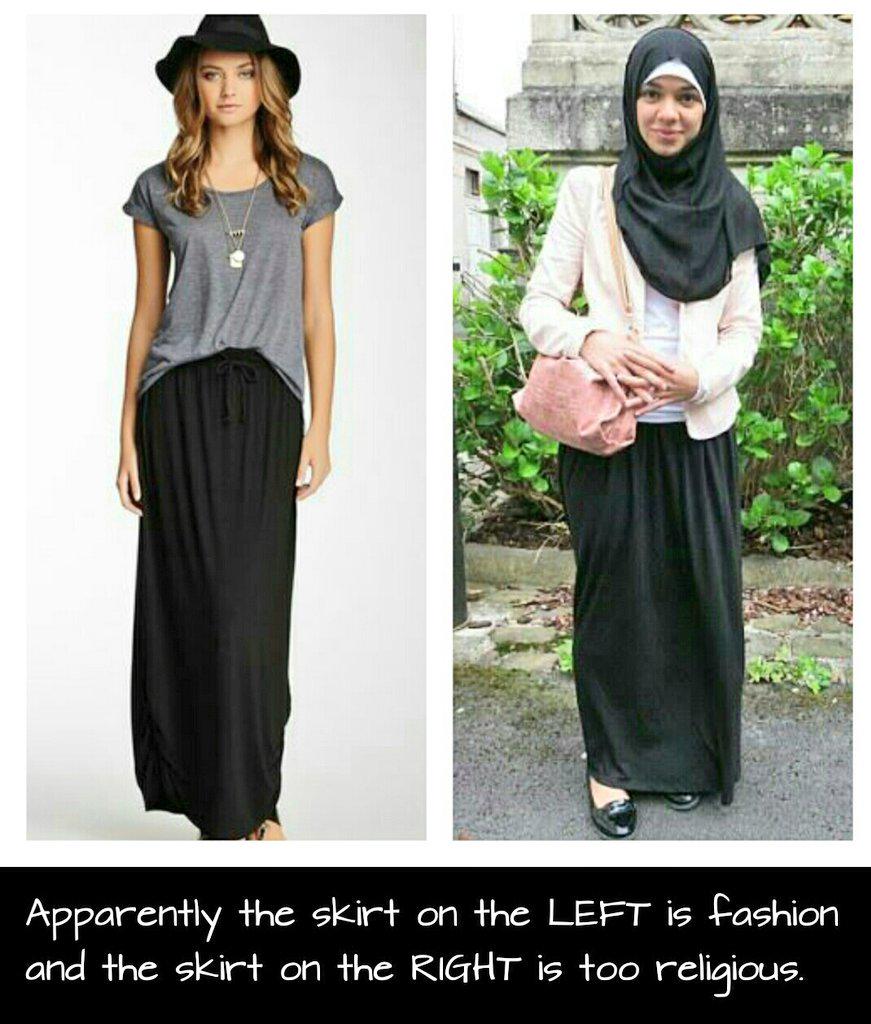فاروق احمد بھٹی
محفلین
فرانس میں ایک پندرہ سالہ مسلمان لڑکی سارا کو اسکول میں لانگ سکرٹ پہننے پر گھر بھیج دیا گیا ، مغرب جہاں ہر قسم کے ننگ دھڑنگ کو تحفظ دینے کو شخصی آزادی کے زمرے میں رکھا جاتا ہے اس لڑکی کو با حیاء لباس کی آزادی نہیں۔
جملہ معترضہ: اس خبر کو ملالہ کے ساتھ نہ جوڑا جائے کہ اس 15 سالہ لڑکی سارا کو سکول جانے (تعلیم حاصل کرنے) سے نہیں روکا گیا۔ صرف لانگ سکرٹ پہن کر سکول آنے (تعلیم حاصل کرنے) سے روکا گیا ہے۔

جملہ معترضہ: اس خبر کو ملالہ کے ساتھ نہ جوڑا جائے کہ اس 15 سالہ لڑکی سارا کو سکول جانے (تعلیم حاصل کرنے) سے نہیں روکا گیا۔ صرف لانگ سکرٹ پہن کر سکول آنے (تعلیم حاصل کرنے) سے روکا گیا ہے۔
France is facing a fresh backlash against its strict secular policy after it emerged a 15-year-old Muslim girl was sent home from school because she was wearing a long black skirt.
The student, named as Sarah, was twice blocked from classes because the principal said her skirt broke a ban on religious signs in schools.
The girl removed her headscarf but said the skirt was not a religious symbol.
The case has provoked angry reactions online.
The hashtag #JePorteMaJupeCommeJeVeux, or "I wear my skirt how I want to" has had more than 45,000 tweets since Tuesday.
Extreme interpretations
The schoolgirl was sent home in Charleville-Mezieres in the northern Champagne-Ardenne region twice in April, according to reports.
Nicolas Cadene, an official advising the prime minister on secular issues, has said that wearing a long black skirt to school does not break the rules.
A ban on Muslim headscarves and other "conspicuous" religious symbols at state schools was introduced in 2004, and widely welcomed in a country where the separation of state and religion is enshrined in law.
"The 2004 law says that symbols and clothing worn to show religious affiliation are prohibited," Mr Cadene told Buzzfeed France (in French
"We obviously think of the veil, the kippah, a large cross, a Sikh turban... A black skirt do not contravene the law."
But critics say some schools are increasingly imposing extreme interpretations of the ban.
Analysis: Hugh Schofield, BBC News, Paris
The 2004 law was supposed to settle once and for all the problem of religious signs in schools.
With Islamic head-coverings - the original issue - it can be said to have succeeded. Today no-one wears them. But instead the argument has shifted elsewhere: to skirts for girls and beards for boys.
It may sound silly for the academic establishment to get exercised over an ankle-length skirt, which has been in and out fashion for many years.
But the point for the school is not so much the garment as the attitude. If Muslim girls start wearing long skirts in a conspicuous effort to show their faith, then some will argue that is a breach of the 2004 law.
The risk is that with the help of social media this now turns into a nationwide challenge, at a time when tensions over Islamophobia and secular values are already pretty hot.
The Collective Against Islamophobia in France (CCIF) said they had recorded nearly 130 similar incidents in the country last year.
In 2011 France became the first European country to ban the full-face Islamic veil - the niqab - in public places.
Most of the population - including most Muslims - agree with the government when it describes the face-covering veil as an affront to society's values. Critics - many outside France - say it is a violation of individual liberties.
The European Court of Human Rights upheld the ban last July after it was challenged by a 24-year-old French woman, who argued that it violated her freedom of religion and expression.
France has about five million Muslims - the largest Muslim minority in Western Europe - but it is thought only about 2,000 women wear full veils.
http://www.msn.com/en-us/news/world/...m?ocid=SKY2DHP
The student, named as Sarah, was twice blocked from classes because the principal said her skirt broke a ban on religious signs in schools.
The girl removed her headscarf but said the skirt was not a religious symbol.
The case has provoked angry reactions online.
The hashtag #JePorteMaJupeCommeJeVeux, or "I wear my skirt how I want to" has had more than 45,000 tweets since Tuesday.
Extreme interpretations
The schoolgirl was sent home in Charleville-Mezieres in the northern Champagne-Ardenne region twice in April, according to reports.
Nicolas Cadene, an official advising the prime minister on secular issues, has said that wearing a long black skirt to school does not break the rules.
A ban on Muslim headscarves and other "conspicuous" religious symbols at state schools was introduced in 2004, and widely welcomed in a country where the separation of state and religion is enshrined in law.
"The 2004 law says that symbols and clothing worn to show religious affiliation are prohibited," Mr Cadene told Buzzfeed France (in French
"We obviously think of the veil, the kippah, a large cross, a Sikh turban... A black skirt do not contravene the law."
But critics say some schools are increasingly imposing extreme interpretations of the ban.
Analysis: Hugh Schofield, BBC News, Paris
The 2004 law was supposed to settle once and for all the problem of religious signs in schools.
With Islamic head-coverings - the original issue - it can be said to have succeeded. Today no-one wears them. But instead the argument has shifted elsewhere: to skirts for girls and beards for boys.
It may sound silly for the academic establishment to get exercised over an ankle-length skirt, which has been in and out fashion for many years.
But the point for the school is not so much the garment as the attitude. If Muslim girls start wearing long skirts in a conspicuous effort to show their faith, then some will argue that is a breach of the 2004 law.
The risk is that with the help of social media this now turns into a nationwide challenge, at a time when tensions over Islamophobia and secular values are already pretty hot.
The Collective Against Islamophobia in France (CCIF) said they had recorded nearly 130 similar incidents in the country last year.
In 2011 France became the first European country to ban the full-face Islamic veil - the niqab - in public places.
Most of the population - including most Muslims - agree with the government when it describes the face-covering veil as an affront to society's values. Critics - many outside France - say it is a violation of individual liberties.
The European Court of Human Rights upheld the ban last July after it was challenged by a 24-year-old French woman, who argued that it violated her freedom of religion and expression.
France has about five million Muslims - the largest Muslim minority in Western Europe - but it is thought only about 2,000 women wear full veils.
http://www.msn.com/en-us/news/world/...m?ocid=SKY2DHP
آخری تدوین:







